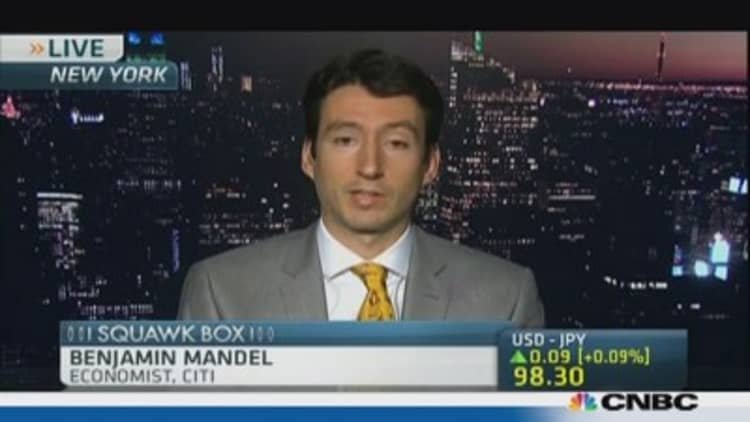Business sentiment in Japan rose to its highest level in almost six years in the September quarter, the closely-watched Tankan survey showed, a good sign for Prime Minister Shinzo Abe as he announced the go-ahead on Tuesday for a controversial rise in Japan's sales tax.
The headline index of sentiment among big manufacturers rose to plus 12 in the three months to September from plus 4 in the June quarter, well above analyst expectations in a Reuters poll for a rise to plus 7, the Bank of Japan's (BOJ) Tankan survey showed. It was the highest reading since December 2007.
(Read more: Abe to rule on sales tax: Will he, won't he?)
There was also an improvement in sentiment among large non-manufacturing firms, with the headline confidence index rising to plus 14 in the September quarter from plus 12 in June.
"Companies have certainly become more optimistic and this is a major impact of Abenomics," said Martin Schulz, senior economist at the Fujitsu Research Institute, referring to the radical economic policies of Japan's prime minister.
A rise in business sentiment is important as it suggests Japanese firms may be more willing to raise wages - something that the government sees as key for ending deflation.
Japan's economy, the world's third largest, has shown signs of a recovery in recent months thanks to aggressive monetary stimulus from the BOJ and fiscal stimulus from the government.
(Read more: Japan's consumer inflation rises to 5-year high)
Sales tax hike?

Analysts said the upbeat Tankan survey painted a positive backdrop for Abe, who said a rise in the sales tax to 8 percent from 5 percent would go ahead next year.
(Read more: Japan's Abe: sales tax to rise next year)
Japan's prime minister is expected to unveil economic stimulus measures later in the day to buffer any negative impact on the economy.
"I think the economy can handle a rise in the sale tax. The real issue is about putting some meat on the bones about structural issues," Bank of Singapore Chief Economist Richard Jerram said, adding that he expected Abe to announce a cut in corporate tax and other incentives to help businesses weather the impact of a hike in the sales tax.
There have been some concerns that raising the consumption tax could undermine a nascent recovery, with data on Tuesday casting some doubt over the strength of a rebound in the domestic economy.
Household spending in Japan fell 1.6 percent in August from a year earlier, compared with market expectations for a 0.1 percent increase and a 0.5 percent fall in July.
The jobless rate meanwhile rose unexpectedly in August to 4.1 percent from 3.8 percent in July.
(Read more: Japan sales tax hike masks bigger problem of welfare spending)
The bigger picture
Economists said that while these numbers were on the softer side, the bigger picture was one of a gradually improving Japanese economy.
"The recent data leaves something to be desired but look at it in the context of the broader data, which suggests the continuation of a solid growth rate in Japan," Citi Economist Benjamin Mendel told CNBC Asia's "Squawk Box." "Overall there are signs of strength in the economy."
(Read more: Will Japan's elderly get burned by 'Abenomics')
"There seems to be a consensus that the tax hike will go ahead. More broadly, I think the government is trying to send a signal that it is trying to get its debt on a more sustainable path," he added.
Raising the sales tax is seen as key to alleviating pressure on Japan, which has a national debt more than twice the size of its economy.
—By CNBC.Com's Dhara Ranasinghe; Follow her on Twitter @DharaCNBC


